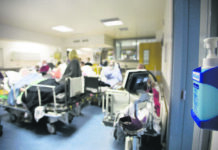
SHANNON is in mourning this week following the death of a 16-year-old student from bacterial meningitis.
Aoife Johnston, from Cronan Lawn, became suddenly unwell on Saturday and was admitted to University Hospital Limerick where she passed away on Monday.
A student St Caimin’s Community School, Aoife has been described as hugely popular and kind-hearted. She worked in Mentor Graphics during the summer holidays when she was studying for her junior cert exams.
A critical incident management plan has been put in place in St Caimin’s to help students come to terms with the tragedy. A school Christmas show scheduled to take place on Tuesday night was cancelled.
The school is open and psychologists from the National Educational Psychological Service (NEPS) have been advising staff to help manage the grief of her schoolmates.
Aoife is survived by her heartbroken family, parents James and Carol, sisters Meagan and Kate, grandparents Jimmy and Evelyn, boyfriend Cillian, aunts, uncles, cousins, the extended Johnston and McCoy families, neighbours and a wide circle of friends.
Her funeral mass will take place on Thursday at 11am with burial afterwards in Illaunmanagh Cemetery.
In a statement issued this evening, a spokesman for the Department of Public Health Mid-West said that they were investigating a single case of confirmed meningococcal disease in Clare.
“Public Health Mid-West was notified of the case in recent days, and concerns a teenager who sadly died.Close contacts are being contacted and offered treatment,” he explained.
However, the spokesman emphasised that the overall risk to the wider community is considered low.
“Person-to-person spread of meningococcal disease is very unusual, especially with others who are not a household or physically close personal contact.
“Meningitis is a serious illness involving inflammation of the membranes covering the brain and spinal cord that can be caused by a variety of germs, mainly bacteria and viruses.
“Bacterial meningitis is less common but usually more serious than viral meningitis and requires urgent treatment with antibiotics. Bacterial meningitis may be accompanied by blood poisoning. The bacteria live in the nose and throat of healthy people without causing illness.
“The spread of the bacteria is caused by droplets from the nose and mouth. The illness occurs most frequently in young children and adolescents, usually as isolated cases.
“Bacterial meningitis or septicaemia requires urgent antibiotic treatment. Symptoms may include severe headaches, fever, vomiting, drowsiness, discomfort from bright light, neck stiffness and rash
“Meningococcal B disease is prevented by vaccination. The MenB vaccine was introduced in Ireland for all children born on or after October 1, 2016 because children under one year are at the highest risk of meningococcal B disease. All children are offered MenB vaccine at two and four months of age with a booster dose of MenB vaccine given at 12 months.
“First year students in secondary school are offered Men ACWY vaccine,” the spokesman added.









